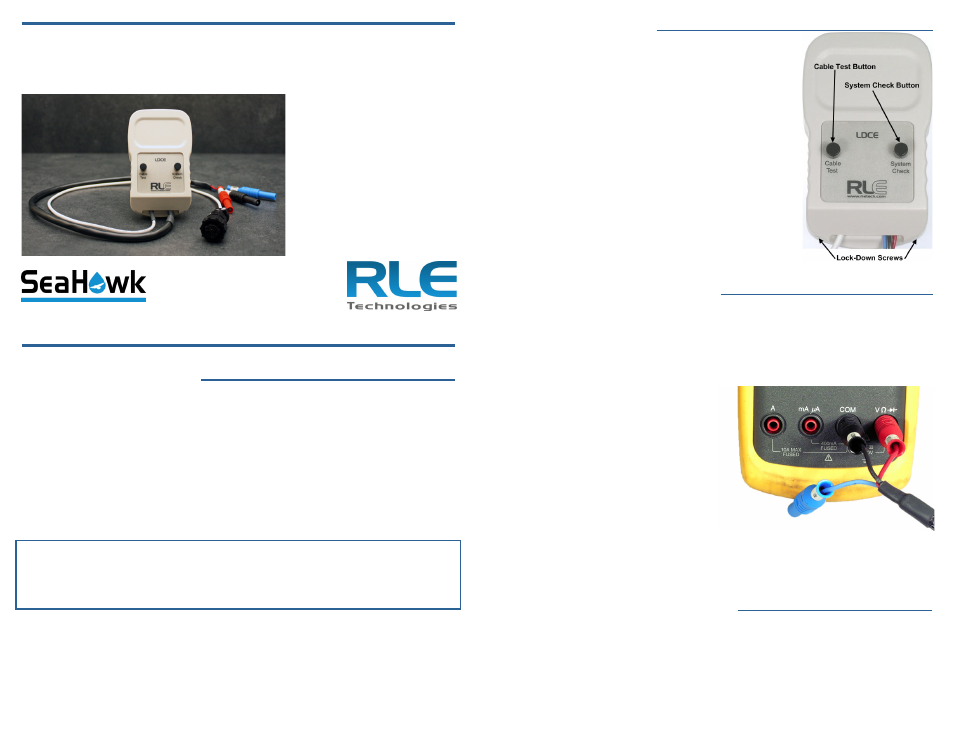RLE LDCE User Manual
Seahawk ldce quick start guide

© Raymond & Lae Engineering, Inc. 2011. All rights reserved. RLE® is a registered trademark and Seahawk™, Falcon™, and Raptor™ are
trademarks of Raymond & Lae Engineering, Inc. The products sold by Raymond & Lae Engineering, Inc. are subject to the limited warranty, limited
liability, and other terms and conditions of sale set forth at http://rletech.com/RLE-Terms-and-Conditions.html.
Supplies for Installation
Included with the LDCE
Leader cable
Meter leads
Available from RLE, sold separately
SeaHawk sensing cable
Available from Other Vendors
Multimeter with mA capability
9V battery to power the LDCE (battery is NOT included with LDCE)
Please Note:
The LDCE can only test for cable contamination or detected leaks. It cannot
test for a broken cable, and it cannot be used to verify that bulk cable has had
connectors properly installed.
Install the 9V Battery
If you are using the LDCE for the first time, install the
9 volt battery (not included with the LDCE) as follows:
1. Screw in the two lock-down screws on the front
cover using a 1/16” (1.59mm) allen wrench.
2. Remove the two push button caps. Lift the cover
and insert the battery.
3. Loosen the lock-down screws of the LDCE until
they are flush with the bottom cover.
4. Replace the push-button caps for each screw you
just loosened.
Test the LDCE Battery Voltage
If you have used the LDCE before and have never replaced the 9-volt battery,
test the battery before testing the sensing cable. To test the battery:
1. Connect the LDCE meter leads to your multimeter, as follows:
• Connect the red lead to the Voltage (V) input.
• Connect the black lead to the Common (COM) input.
Important!
- Do not connect the leads
to the wrong inputs, or you will blow the
multimeter’s internal fuse.
2. Set the multimeter to VDC. If the
multimeter is not auto-ranging, set it
to the 20VDC scale.
3. Push the System Check button on
the LDCE and note the reading on
the multimeter. If it is less than
8VDC, change the LDCE’s battery.
Test the SeaHawk Sensing Cable
The LDCE can test one cable or a string of cables, up to a total length of 5,000
feet (1,524m). To test the SeaHawk sensing cable for contamination:
1. Power down the SeaHawk controller. Disconnect the sensing cable to be
tested and separate the white leader cable from the sensing cable.
2. Connect the LDCE’s white leader cable to the sensing cable you wish to test.
SeaHawk LDCE Quick Start Guide
Thank you for purchasing a
SeaHawk LDCE leak detection
cable evaluator. This guide
outlines device installation and
operation.
If you need further
assistance, please contact RLE
Technologies via our website
- http://www.rletech.com/ (go
to the Support link) or call us
at 970-484-6510, Option 2.
v2.0
(07/2012)
To test the LDCE’s battery, connect it to the
multimeter as shown.
